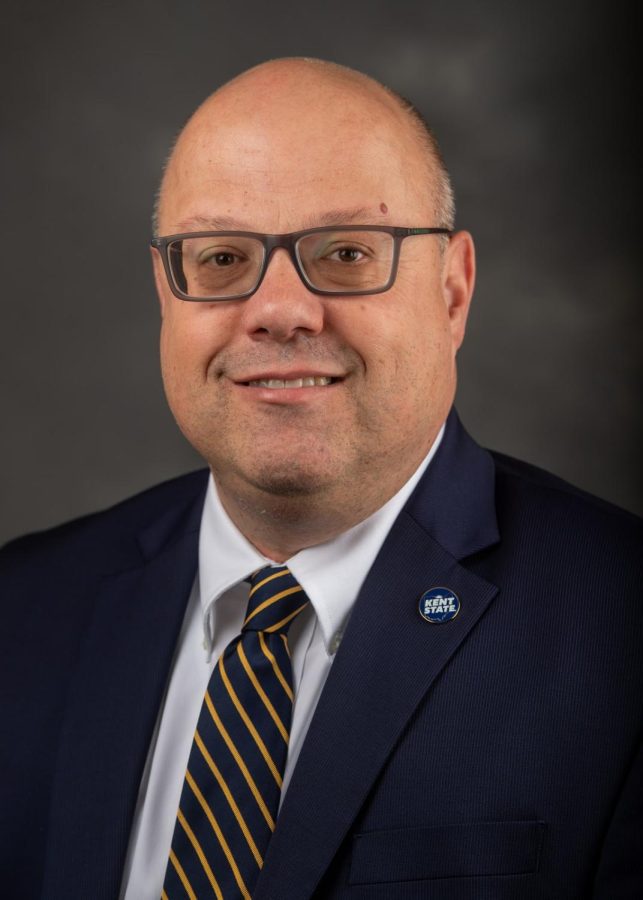Mental health fee not included in state budget
Manfred van Dulmen is the associate provost for academic affairs and the dean of the Division of Graduate Studies.
January 30, 2020
After being approved by the Board of Trustees, a mental health fee for all students awaited legislative provision on the state budget bill before it could be implemented. However, the appropriation for the fee was not included in the state budget, which was signed in summer 2019.
The proposed fee was not added during the approval of the total budget to control cost of attendance, Julie Volcheck, interim assistant vice president of the division of Student Affairs and director of University Health Services, said.
Since May 2019, the university has held discussions about implementing a mental health fee for all students. The fee, which would have been added to students’ bursar bills, aimed to enhance mental health services on campus. The amount of the fee was still undecided when it was approved during the June 2019 Board of Trustees meeting.
“We really want the idea of people thinking about funding mental health versus a fee; it’s one opportunity to contribute to the overall funding, but there are many other ways to also fund it. So because a fee isn’t approved doesn’t mean we’re going to stop advancing initiatives to provide more programs and services,” Volcheck said.
Over the last five months, two committees have been formed to comprehensively look at mental health across all Kent State campuses.
The steering committee has been entrusted with creating a strategic plan that includes a mental health framework and recommendations, Volcheck said. This is the functional group that will accomplish the tasks charged by Interim Vice President of the Division of Student Affairs Lamar Hylton.
The vision committee is a larger group that identified values, guiding principles and the direction the university should go in the future regarding its mental health framework. These priorities were identified during a day-long retreat, where an outside consultant was brought in to advise, said Manfred van Dulmen, interim associate provost for academic affairs. The committee has since reconvened to receive feedback on its initial suggestions and review the draft of a white paper explaining the complex recommendations on improving services.
“We’re setting up a website,” van Dulmen said. “There was a survey that went out in early December as well to students, faculty and staff to get their input. So we’re currently working on a white paper that also will be made available and it will have recommendations.”
The survey ensured that a larger portion of the community could offer their opinions on mental health services, not just those on the committees, Volcheck said. The white paper will be available in the next few weeks as the rest of the recommendations are reviewed.
“All that we’re doing is we’re making recommendations to leadership and providing them with evidence-based information of where we think we need to go to ensure that students can be successful regardless of mental health challenges,” van Dulmen said.
Volcheck and van Dulmen are co-chairs of the mental health committee, which means they are facilitating and coordinating efforts, not making decisions. As co-chairs, they represent student affairs and academic affairs.
The goal of this partnership is to look at mental health through many different lenses — not just as a health issue, but as a diversity issue as well, Volcheck said. The committee members, which include faculty, staff and students, have lent their efforts to be more inclusive and equitable in continuing to put students first in accordance with the university’s Students First Strategic Roadmap priority.
Moving forward, the university would like to focus on all the other ways of funding mental health instead of just a fee. This shift in focus aims to create a sustainable strategy to improve students’ mental health across the entire Kent State system, whether they are traditional, online or abroad, van Dulmen said. This is the starting point for a structure that effectively addresses student mental health holistically through a series of changes, van Dulmen said.
“One of the things that has appeared since those initial discussions last spring with Todd Diacon coming on is that we’re now talking about a ‘student-ready college’ and what that means,” van Dulmen said. “One of the primary pieces of that is that it’s everybody’s responsibility on campus to ensure that students can succeed. We’re shifting not only thinking that it’s the role of counselors to ensure students’ mental health is being addressed but everyone can play a role.”
Abigail Mack is a general assignment reporter. Contact her at [email protected].

























